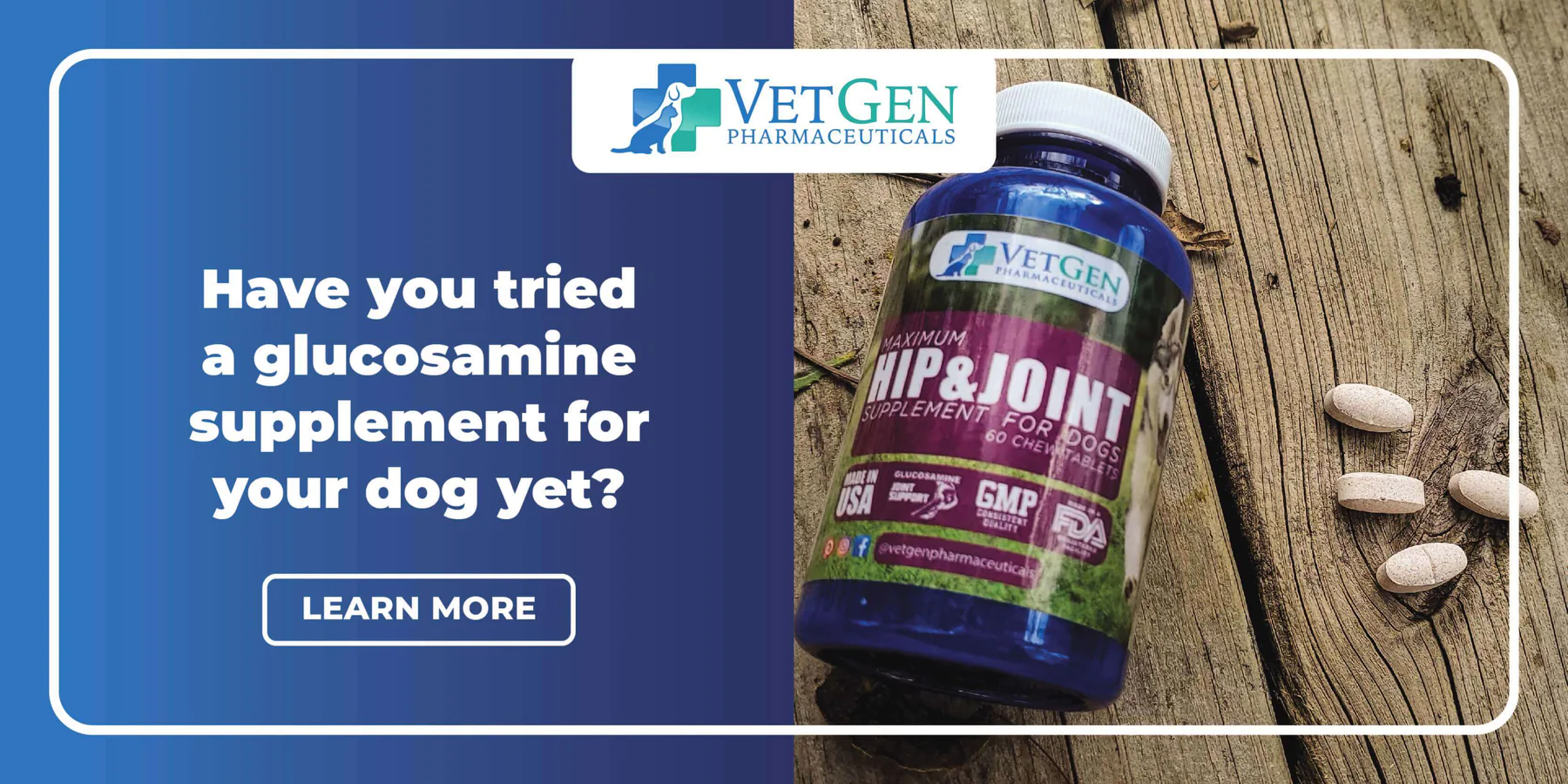Table of Contents
Have you tried glucosamine supplements for dogs?
If not, it’s important to understand what it is and why you should be using it.
Glucosamine is a chemical that’s naturally-produced in dogs.
It is mainly found in cartilage that’s healthy, but can also be found in foods or given as a bone and joint supplement for dogs.
Veterinarians commonly suggest it for dogs that suffer from arthritis or other bone and joint conditions.
Before administering to your dog you should know the proper dosage, delivery methods, and any possible side effects.
We will be discussing these items today.
What Exactly is Glucosamine?
Glucosamine is a combination of glucose and glutamine.
Though your dog’s body produces it naturally, the production levels begin to decrease with age.
This is the reason many people give it to senior dogs.
As the dog ages and less glucosamine is produced, the joints will begin to lose shock absorption and stiffen up.
Let’s Look At the Three Common Glucosamine Forms
- N-Acetyl-Glucosamine: This form is derived from glucose, and is great for gastrointestinal and joint problems. It’s usually created from the outer shells of crustaceans.
- Glucosamine Sulfate: This is the most common form found in many glucosamine supplements for dogs. It’s either made synthetically in a laboratory or taken from shells of shellfish. Sulfur is contained in this form, and is a great component to help repair and build new cartilage.
- Glucosamine Hydrochloride: This type is also found in shellfish, but doesn’t have any sulfate in it.
It’s common for glucosamine to be combined with MSM or chondroitin, as both of these compounds are also great for maintaining joint health in dogs.
How Does Glucosamine Work?
Glucosamine supplements for dogs are known to provide relief for several health concerns that dogs are prone to.
It’s great for helping repair cartilage and it’s an anti-inflammatory which is a big help with reducing pain from deterioration of joint cartilage.
Vets also suggest this supplement for dogs with spinal disc injuries, arthritis, and hip dysplasia.
If your dog recently underwent joint surgery it can help with recovery and further slow the aging process of your dogs joints.
Giving your dog N-acetyl-glucosamine can maintain and even improve gut health.
It can reduce any inflammation present in the digestive tract, and ease the symptoms of irritable bowel disease.
At What Age Should You Start Your Dog On Glucosamine?
Some of the best joint supplements for dogs contain glucosamine, and those can be given at any age.
Studies have shown that about 20%of dogs one year or older, and 80% of dogs over 7 years of age suffer from achy, stiff joints and arthritis.
As we mentioned, the production of glucosamine slows as your dog ages.
This leads to pain, irritation, and inflammation of bone cartilage.
This supplement may be good to administer if your dog is suffering from any of the following symptoms:
- Having problems jumping on furniture or into the vehicle
- Not wanting to go upstairs
- Difficulties standing up or sitting down
- Limping
- Wanting to go on shorter walks
- Favoring one leg over the other
- Joints that are noticeably swollen
- Holding a limb in the air
- Audible cracking or popping sounds near the hips
Should You Give It To Your Dog?
Glucosamine supplements for dogs can be given at most stages in life.
If your dog is already suffering from arthritis, hip dysplasia, or other degenerative joint diseases, you should consider giving them one of these supplements.
It’s been clinically proven to reduce symptoms of these issues, and definitely can’t hurt to try.
Even if your dog is not displaying these symptoms it can be a good idea to consider bone and joint supplements for dogs.
Remember that preventing issues is easier than treating them.
Once you’ve let an issue get too far out of control, it is hard to reverse.
Of course, you should consult with your dog’s veterinarian before beginning any supplement regime, as they know your dog best and can answer questions you may still have.
How Can I Give My Dog Glucosamine?
Glucosamine supplements for dogs are available in several forms including liquids, pills, tablets, and powders.
Generally you administer them daily.
Naturally extracted glucosamine supplements can be pricey, but they work better than synthetic versions.
Just be sure to determine the proper dosage for your dog, and while their dog food may claim to contain it – it’s probably much less than what a dog actually needs daily to maintain proper joint health.
After speaking with your veterinarian, they may suggest finding a glucosamine supplement that also contains chondroitin sulfate or MSM (methylsulfonylmethane).
Chondroitin is derived naturally from cows’ cartilage or sharks.
This compound is great for helping retain the water in cartilage.
MSM works to improve the flexibility of joints and also reduces inflammation and pain.
Your dog can also eat certain types of food to get more glucosamine naturally.
Foods such as chicken feet, pig or ox tails, bones, trachea, and beef knuckle bones are great sources.
Conclusion
In conclusion, it’s important to consider bone and joint supplements for dogs.
Problems with joints and bones can arise at any point in your dogs life, so the sooner you begin using such supplements for prevention, the longer your dog will remain mobile.
One of the best joint supplements for dogs is called Maximum Hip & Joint by VetGen Pharmaceuticals.
Our chewable tablets are flavored like beef, so your dog will look forward to this “treat” each day. The best part is this supplement contains glucosamine, chondroitin, and MSM – so you can’t go wrong!








